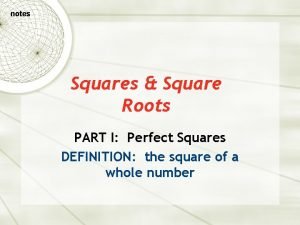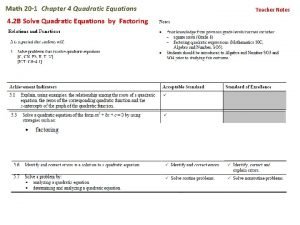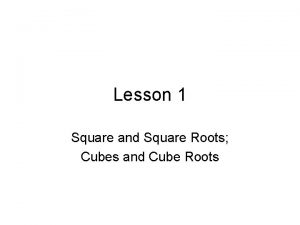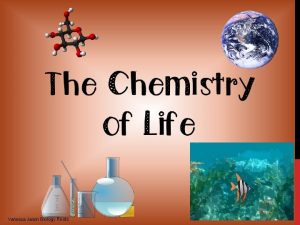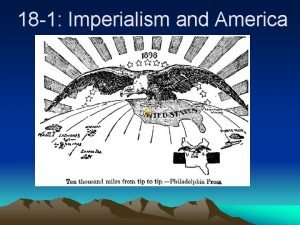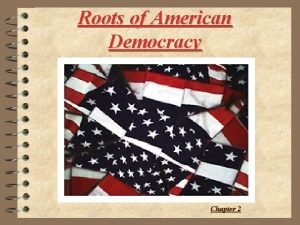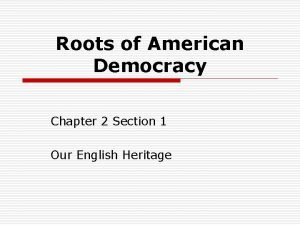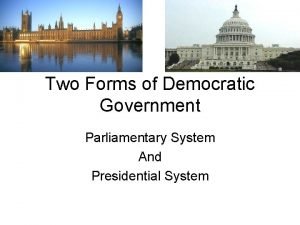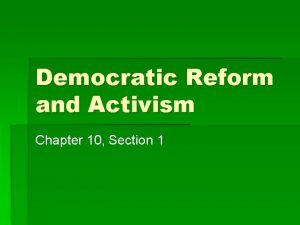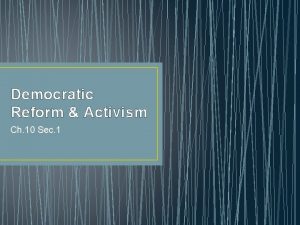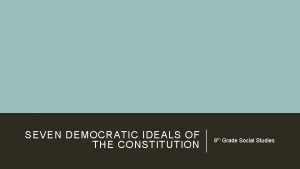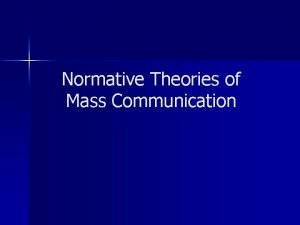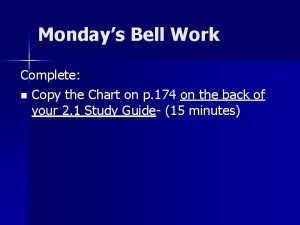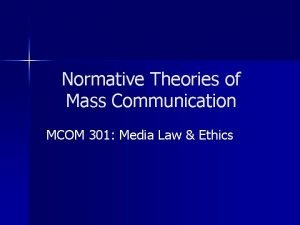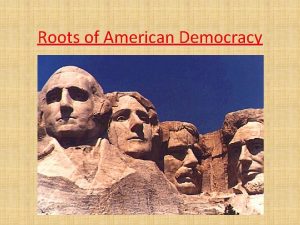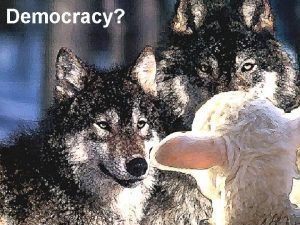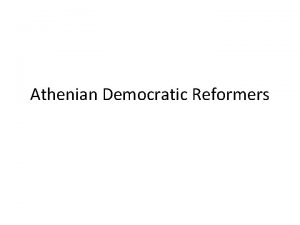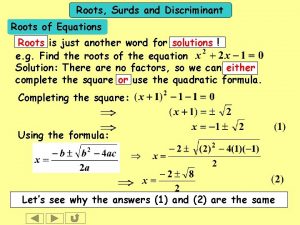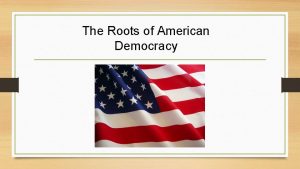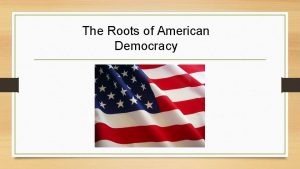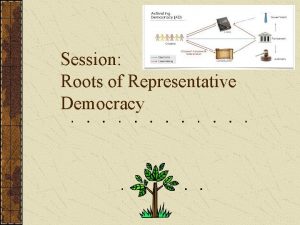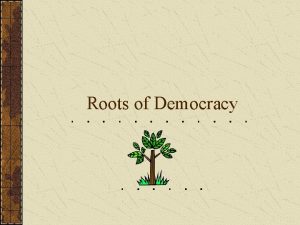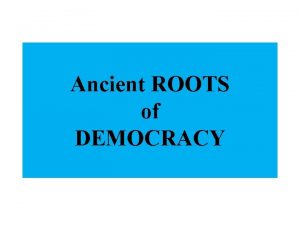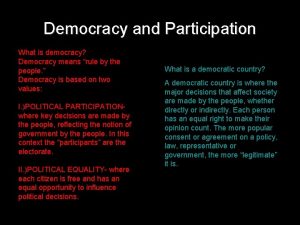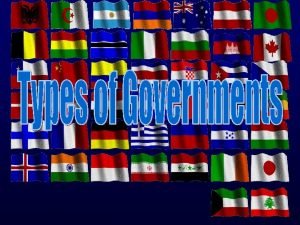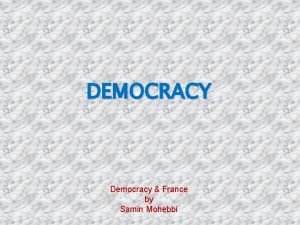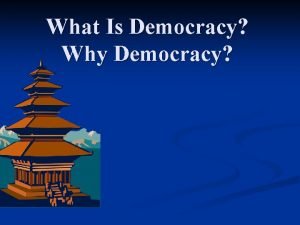DEMOCRACY AND DEMOCRATIC ASSOCIATIONS The roots of democracy
















- Slides: 16

DEMOCRACY AND DEMOCRATIC ASSOCIATIONS

The roots of democracy Democracy is the rule of the people. The term derives from Greek words "demos" (people) and "kratos" (power). It has its origins in Athens, about 2 500 years ago. All adult free men had the right to vote. Women, children, and slaves did not have voting rights.

Democracy in Sweden It began to develop at the end of the XIX century. Development and growth of temperance movements, free churches, trade unions, cooperative movement of labour movements and new political parties. Together, they moved forward the issue of the universal suffrage. In 1921, a vote was held in Sweden, at which, for the first time, all women and men were allowed to vote. Previously, only rich men were allowed to vote; the richer they were, the more votes they could leave.

4 basic principles of the Constitutional Act of Sweden 1. The Constitution states that all the state power emanates from the people Ø 2. 3. The freedom of press Ø Any mass media has the right to publish a newspaper without a previous checking of the content. Ø The communications protection is unique in the world. The freedom of expression Ø 4. The Swedish democracy is based on the freedom of belief, free and universal formation of opinions, as well as on belief that all people are equal before the law. Everyone has the right to express his/her views on radio, on television, in films. The Act of Succession which determines who can become the head / the King of Sweden, was supplemented in 1978 by a provision that allows a woman to run the country as a monarch.

The Swedish democracy today The freedom of expression, the freedom of press, the freedom of assembly, protection of communications Elections are held by majority rule – a majority of votes wins the elections. The right to vote - all persons of full age have the right to vote Participation in elections is free - and secret

Direct democracy versus representative Direct democracy may, for example, be applied in local government, associations, be in the form of a referendum - everyone can participate in a decision-making processes and express his/her opinion. Representative democracy - is, for example, in the Parliament with elected representatives of the people, as well as in large organizations.

Democracy versus Dictatorship Democracy Dictatorship Everyone gets the right to vote in free elections One or more dictators decide for everyone else All people are equal Those who do not obey the orders of the governor, may be punished Everybody has equal rights (choice of employment and residence, taking part in political life, organization of public meetings, creating organizations) To make people obey, violence can be used The governor believes that some people are more valuable than others Those who are in power do not listen to others Not everyone has the same rights and responsibilities All have equal responsibilities (for example, paying taxes, obeying the law) Everybody can speak freely and express his/her opinion People are not free to speak and to express their views No one should be discriminated against Books, movies and songs may be prohibited

Dictatorship Fascism, Nazism - some people are stronger than others Communism - decisions should be taken by the state, not by the people Theocracy - power must be carried out according to the laws of God

Discussion: why is the freedom of the press is always valuable?

Democracy in associations/organizations Democracy is expressed in the Charter § 1. The name of the Organization, its registration number. § 2. The legal address - for example, city, country. § 3. The purpose: indicates what the organization needs to do and why it exists. § 4. The composition of the participants; free membership to all who wish to contribute to the goals and objectives of the Organization, as well as to follow its Charter. § 5. How to state the desire to become a member. § 6. Membership fee / annual fee. § 7. Refusal to participate - in case if the participant does not wish to continue to cooperate.

Democracy in associations/organizations § 8. The exception - if a member opposes the objectives of the association, intentionally causing damage to the association, violates the Charter, or counteracts the agreed decisions. § 9. The Board of Directors / the Management - consists of the President, the Nth number of other participants and delegates. The Board of Directors elects the Vice President, a secretary, a cashier and other members, whose election the association considers necessary. The Board of Directors may also decide to establish a working group. § 10. The duties of the Board of Directors - the Board of Directors represents the Association, protects interests and regulates its activity. The Board of Directors takes decisions in the interests of the association. The Board of Directors shall carry out the decisions taken at the annual meetings, conduct financial affairs, as well as submit an annual report at the annual general meeting.

Democracy in associations/organizations § 11. The financial documentation – a financial year often coincides with a calendar one. § 12. Auditor - during the annual general meeting two permanent and one substitute auditor are being appointed, who monitor the association activities and provide a report at the annual general meeting. § 13. The Annual General Meeting, which is the supreme governing body is held once a year at a time and place set by the Board of Directors. § 14. The Extraordinary General Meeting – is held in case if the Board of Directors or the auditors consider it necessary, or if at least one tenth of the members of the association have filed a written request to the Board of Directors.

Democracy in associations/organizations § 15. Voting - at the annual meeting, each participant is entitled to one vote. § 16. Decision-making, voting and quorum - decision-making takes place on the basis of the unanimous noisy approval, or (if necessary) during the voting. § 17. The rules of amendment of the Charter – the decision for amendment may be made at the annual meeting if at least 2/3 of the members have voted "for". § 18. The dissolution of the Association requires the adoption and confirmation of the decision on two consecutive Annual General Meetings, during which at least 2/3 of the members have voted "for".

CINGO: the facts CINGO – is the Belarusian Civil Society Network of Groups and Organizations. Purpose / General objectives: First of all, thanks to the transfer and exchange of knowledge and development of competences, the CINGO will help to enhance and contribute to the development of civil society organizations / social economy. The fight against unemployment and poverty through the development of social economy / civil society. The development of entrepreneurial capacity of organizations in the course of the project will increase the supply and demand in the labour market, and strengthen their position in the Belarusian society. The network (community) members: local development groups, civil society organizations, and social enterprises; entrepreneurs working in the field of social economy; people who take an active part in local development; people deprived of the opportunity to compete in the labour market (people with disabilities, long-term unemployed, ex-addicts, and others).

CINGO: the work principles Transparency Trust Loyalty Transparency in the decision-making process

questions and answers
 Existence and uniqueness of square roots and cube roots
Existence and uniqueness of square roots and cube roots Square roots and cube roots guided notes
Square roots and cube roots guided notes Sum of the roots and product of the roots formula
Sum of the roots and product of the roots formula Squares square roots cubes and cube roots
Squares square roots cubes and cube roots Vanessa jason biology roots
Vanessa jason biology roots The roots of american imperialism 1. economic roots
The roots of american imperialism 1. economic roots Chapter 2 roots of american democracy answers
Chapter 2 roots of american democracy answers Chapter 2 roots of american democracy answers
Chapter 2 roots of american democracy answers Parliamentary democracy vs presidential democracy
Parliamentary democracy vs presidential democracy Chapter 10 section 1 democratic reform and activism
Chapter 10 section 1 democratic reform and activism Chapter 10 section 1 democratic reform and activism
Chapter 10 section 1 democratic reform and activism Project planning begins with the melding of
Project planning begins with the melding of 7 democratic ideals
7 democratic ideals Normative theory
Normative theory Federalist vs democratic republicans chart
Federalist vs democratic republicans chart Elon musk's leadership style
Elon musk's leadership style Democratic participant media theory
Democratic participant media theory

